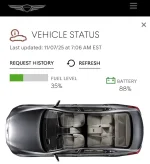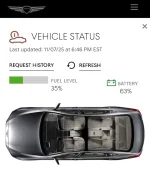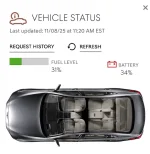Battery drains that kill batteries overnight should be easy to diagnose. A simple test: get a small 12volt light bulb, like a dome light (not a LED version) or a small side marker light bulb and socket with wires. Unhook the battery positive cable (red wire/cover) and slip the light between the cable and the battery positive post. If the light glows much at all there is a power drain. Just opening a door, or hitting the key FOB unlock, to wake up the car is enough. Open the hood and both front doors so you can access the fuses. Use tape to hold the door closed sense switches located in the bodywork structure. Then use a screwdriver shank in the door latch mechanism which is on the back edge of the door - it'll be a rather beefy metal claw - use the screwdriver shank to push the crotch of the claw towards the outside of the door; basically the same thing as the "U" shaped metal piece on the bodywork does when you close the door. Do that to both front doors. And tape the hood open sensor (look for a rubber bumper along the edge of the hood, see what it pushes on when the hood is closed to locate that switch) in the hood-closed position. Basically do everything to make the car electronics think all doors, trunk/hatch, and hood are closed. Wait 20 minutes for the electronics to "time out" and go to full standby mode. At this point our little test lamp should not be glowing. If it is... something is still drawing electrical current. Unplug a fuse and see if that makes the light go out, or at least get a lot dimmer, to see what circuits are drawing current. No change in the bulb? Put the fuse back and try another. Note: cycle the interior door handles to open that beefy claw before you try closing the doors again!
Another thing that kills batteries quickly is a bad alternator. Modern alternators generate 3-phase electrical A/C power internally, that gets rectified (converted) to DC by a series of diodes. Think of diodes as wires that pass electrical current in only one direction. If one of those diodes fails by shorting out, it provides a low resistance short-circuit across the battery. A good alternator test machine can spot this as the DC output will be "lumpy" if 1 of the 3 phases isn't doing it's job. Dealers should be able to do this test. As an option, you can:
1: disconnect the battery negative post first, then disconnect the positive post.
2: Look at the alternator, you'll see a multi-wire connector and usually a separate wire that is much larger in cross section. Undo that wire - it's the charge wire from the alternator to the battery. And undo the multi-wire electrical connector.
3: reconnect the battery - positive post first, then negative. Do not start the engine until all tests are complete.
4: wait overnight.
5: if the battery is good then you've proven the alternator has issues. Undo the battery negative and then positive posts again, reconnect the alternator's beefy wire and electrical connector, then re-connect the battery positive and then the negative post and make the dealer test the alternator.
Why disconnect the battery when working with the alternator wiring? Simple: that beefy wire, and possibly some wires on the smaller connector, go straight to the battery positive post while the alternator's case is ground which is also the battery negative post. You don't want to create massive short circuits if your wrench or other tools happen to touch the fasteners holding the beefy wire and the alternator case at the same time. Lotsa sparks at least, maybe soiled underpants, and possibly fried wires from the short-circuit, would result if the battery were still connected to the car. Disconnecting both battery posts is somewhat overkill - just disconnecting the negative/black/ground is enough for this test. But, as a "safety thing" for other jobs (including replacing the battery), I am in the habit of doing both posts in the order specified to minimize the chances of accidental short-circuits with the tools. Even at the battery... your wrench could be tightening the positive post connector and bump the bodywork... if the negative post were connected that bodywork is ground and you'd have a spark show again. Shorting from the negative post to the bodywork is not an issue as they are normally connected anyways.
If you are tool handy and can remove the alternator, most good auto parts stores have test rigs that can verify the 3 phases are working, that there are no shorted diodes, etc. NAPA generally has the machines, call around your local auto parts stores and ask if they can test 2024 GV80 alternators for whichever engine you have.
What did the dealer do on the 8/31-9/15 visit to confirm a battery draw existing? Sounds like they measured the current flow which is what my light bulb test does. But what did they do after "yup, something is draining the battery" to identify WHAT was actually draining the battery? If all they did was look for computer error codes using the OBD-II port... they suck as diagnostic mechanics.
Note: as with many modern cars that have seat memories, power windows, power everything, those gizmos will need to be reset after doing my light bulb test. Just as they would need to be reset after changing the battery. The light bulb serves as a low cost amp meter (aka ammeter); a device used to measure electrical current flow. You can buy ammeters or multimeters that include ammeter functions (very common electrical tool) but most are limited to 10 or 20 amps max... Whatever is killing your battery may be sucking down more than that and would fry the fuse in the ammeter. A 12 volt light bulb is designed to be connected directly to a 12 volt battery source - it can't draw more than a few amps - and will serve as a current limiting device when connected as I described... even if whatever is killing your batteries is a direct short, the electrical current through the bulb would be no higher than it would be if the bulb were connected straight to the battery. Simple "two items in series resistance" electrical theory.
Before Genesis existed as a stand-alone brand, the early 2009 Hyundai Genesis sedans had a somewhat similar issue: the battery would drain in a day or two when the car was parked. The cause was that rubber bumper along the driver side edge of the hood being too short: it sometimes didn't fully press the "hood is closed" switch (also used by the car alarm) so the car thought "hood is open." Any door/hood/trunk being open caused the electronics to partially "wake up" or "boot up" which consumes a lot more energy than the fully OFF condition. After parking the car, and shutting off the engine, the electronics would go to a "standby" mode which used less electricity than fully ON but much more than fully OFF... that STANDBY mode would time out after 20 minutes or so; the electronics would then go fully OFF. For the 2009's with the Tech package, a blue light at the CD/DVD slot would blink a few times at this 20 minute point; once it stopped blinking the system was in full OFF mode. I'm not aware of any similar indication on GV80s. But if any door/hood/trunk switch indicated something was open, the electronics remained in STANDBY forever... or at least until the battery was dead. .. that blue light never blinked. There is a TSB for this rubber bumper. I don't know details on the 2024 GV80s; my 2021 GV80 doesn't have this bumper but it does seem to have a switch in the hood latch assembly that probably does the same thing.
mike c.
note: some folks say unplugging a battery on modern cars is a no-no. It certainly is if the engine is ON/running. But with everything off? The factory service manual will have guidelines on what is necessary to replace/disconnect the battery... dealers have this info. Owner's manuals in the maintenance section, especially if there are notes about how to replace the battery, will have warnings if such a procedure is not recommended. My 2021 owners manual specifically states to disconnect the battery if the car will be parked/stored for an extended time, especially if the weather is cold (BATTERY section in chapter 9), and lists the "reset" steps for the various electronic memories. So it is safe to disconnect the battery on 2021s. 2024 owners manuals probably have similar wording.











